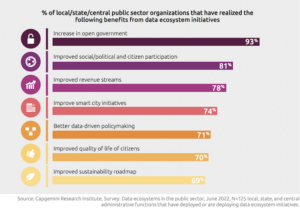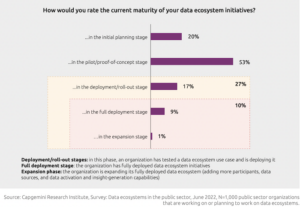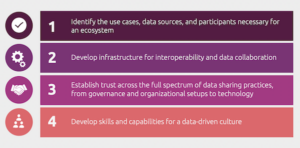Capgemini has released a report finding that only 27% of public sector organizations are rolling out or have fully deployed data ecosystem initiatives, revealing a need for bolstering data maturity in the public sector.
The company’s report, “Connecting the Dots: Data Sharing in the Public Sector,” explores the role of data ecosystems in the public sector. These systems are collaboratively used by agencies and organizations to provide a systematic approach to data sharing and can improve a host of public factors for citizens. The report, based on a survey of one thousand global public sector organizations, looks at how these organizations can benefit from data ecosystems, how they are currently engaging in data ecosystem initiatives, and how they can progress toward data maturity.
Data maturity, or how effectively an organization derives value from its data, underpins the successful creation and use of a data ecosystem. Businesses in the private sector are also focused on data maturity, and a recent Splunk report found that the most data mature organizations are increasing profits by 9.5% and are 4.5 times more likely to occupy a strong market position. Could data ecosystems be the key to data maturity success for the public sector?
“While the public sector may not be on the cutting edge of data sharing compared to the private sector, it will be instrumental in driving general acceptance and usage of data sharing standards, processes, and tools,” said Andrew Kuoh, principal, business intelligence systems & analytics at Capgemini Government Solutions, in an email interview with Datanami.
Capgemini’s survey found that public sector leaders are seeing the potential in data ecosystems, as its respondents believe these systems can enable a 9.5% improvement on average in the use of government funds and resources. Those who have already deployed data ecosystems report improved efficiency, effectiveness, and outcomes. But there are challenges holding back the progress these ecosystems aim to achieve: “Several factors delay the development and deployment of data sharing in the U.S. In our latest report, Capgemini found that culture, trust, and technology are among the top reasons that slow down public sector data sharing efforts,” said Kuoh.
Data Sharing Benefits
The local, state, and central administrative organizations that have deployed or are deploying data ecosystems reported several benefits of these systems, including an increase in open government (93%), improved citizen engagement (81%), and an increase in data-driven policymaking (71%). The report gives an example of Hamburg, Germany, where a data platform called Urban Data Platform Hamburg links many citywide systems and databases together using APIs. The data platform enables a digital system designed to drive citizen participation in urban planning by giving residents a platform to provide feedback, as well as professional urban planning tools, including a GIS-based planning system with data visualization and analytics tools.
Security and defense departments have also reported benefits from adopting data ecosystems. These include improved resilience to cyber threats (78%), increased citizen satisfaction (74%), and improved decision-making (73%). Police in Fulton County, Georgia (Atlanta) have adopted a data sharing platform connecting criminal justice agencies, courts, and behavioral health systems, the report explains. The platform has helped judges and police departments direct individuals with mental illness or substance abuse issues to the proper healthcare facilities, which can help lower incarceration rates for the county’s most at-risk citizens.
Barriers to Engagement
Obviously, benefits like these examples cannot be fully realized without widespread adoption of these data ecosystems. Capgemini says that nearly three-quarters of public sector organizations are missing out on the opportunity data ecosystems provide for collaboration. The report looked at how many public organizations currently have these systems in the works, finding that 80% of those surveyed have started implementing data ecosystem initiatives. However, of that 80%, 53% were still in the pilot or proof-of-concept phase, while just 27% were in the deployment phase, with only 9% reporting full deployment and 1% reporting expansion within that stage.
Culture is a major barrier to deployment and expansion, as well as a lack of trust. As is the case with the private sector, building a data-driven culture within public organizations is key, but 54% of those surveyed reported facing one or more challenges related to culture, such as a lack of collaboration between government agencies, lack of talent and skillsets, lack of a digital culture to support data sharing and collaboration, and a lack of dedicated leadership to steer data sharing initiatives.
“In terms of culture, federal programs have to deal with data silos and upskilling workforce and address the inherent nature of their defense, security, and intelligence missions. Given the extreme scale and scope of federal programs, they also have to balance providing transparency in the complex collection and presentation of data to engender trust without compromising security and privacy,” noted Kuoh. The report shows that 56% of respondents revealed running into issues such as citizen resistance to sharing data, skepticism regarding the data-handling practices of ecosystem partners, and lack of trust in the quality of internal and external data.
Technology is another obstacle: “Federal programs also face much higher technology costs driven by the security and interoperability requirements that come with their scale and scope. Specifically regarding security, all data ecosystem components must meet federal information security requirements, which often means extensive assessment, testing, and training to ensure compliance,” said Kuoh.
Path to Maturity
How can public organizations get past these barriers in order to develop mature data ecosystems? Capgemini’s report recommends several key actions they can take. The first is to identify the use cases, data sources, and participants necessary for an ecosystem, which can accelerate the second suggestion of developing the infrastructure for interoperability and data collaboration: “In the short term, federal programs should start small and identify viable use cases with a probable positive return on investment. In our experience, this usually means developing data sharing tools with a limited number of stakeholders using existing tools and infrastructure to exchange a small set of data,” said Kuoh. “If architected well, these tools are proof of value to obtain buy-in and funding so that they can be scaled up. The key to success for these tools is to limit scope creep and leverage software with current Authorization to Operate (ATO) from the start.” Data exchange platforms, decentralized data management architectures, and cloud-based data environments are prime components of an interoperable data ecosystem, according to the report.
The next suggested action item is to establish trust across the full spectrum of data sharing practices, from governance and organizational setups to technology. “In the long term, we found it is critical to establish trust because, without trust in the data, no amount of customization and configuration of the tools and infrastructure will compel stakeholders to provide, share, and use data. The key to success for establishing trust is to build governance mechanisms that drive transparency and accountability. This should include clear roles, responsibilities, regulations, the methodologies to audit processes and address any concerns,” remarked Kuoh.
 Finally, it all comes down to developing the skills and capabilities needed for a data-driven culture. Capgemini emphasizes that public sector organizations need to ensure that data is viewed as an asset by all employees, not just the IT or data teams, as well as incentivize employees to collaborate using data, while clarifying the rules around responsible data sharing. On a larger scale, setting up innovation labs or data academies, collaborating with universities, and championing the role of the chief data officer are other ways to accomplish the goal of upskilling.
Finally, it all comes down to developing the skills and capabilities needed for a data-driven culture. Capgemini emphasizes that public sector organizations need to ensure that data is viewed as an asset by all employees, not just the IT or data teams, as well as incentivize employees to collaborate using data, while clarifying the rules around responsible data sharing. On a larger scale, setting up innovation labs or data academies, collaborating with universities, and championing the role of the chief data officer are other ways to accomplish the goal of upskilling.
Kuoh believes surmounting these challenges is worth it for the societal impacts: “Capgemini found that once federal programs overcome these obstacles, they see significant benefits in the form of increased stakeholder engagement, efficiency in internal and external processes, and overall effectiveness of the programs,” he said. “Personally, I found the diverse and distinct benefits generated by data sharing to be fascinating. For example, seeing improved smart city initiatives and support of at-risk or disadvantaged citizens illustrates how successful data sharing can have a profound and wide-reaching impact. So even though it is challenging, seeing these benefits is a good reminder that the destination of mature data ecosystems is worth the journey.”
Read the detailed report at this link.
Related Items:
‘Data First’ Approach is ‘North Star’ of Digital Transformation: HPE CEO
New ‘Maturity Index’ Seeks Answers to Data Questions
Data-savvy Organizations Are 9.5% More Profitable: Splunk
The post Capgemini Connects the Dots on Public Data Ecosystems appeared first on Datanami.




0 Commentaires